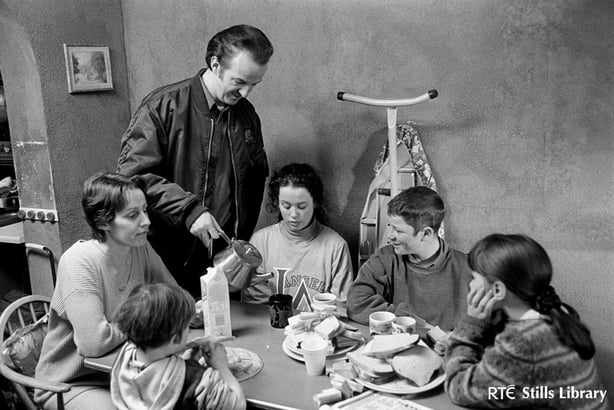The 1990s was a big decade for little Ireland. We played in two World Cups. We couldn't seem to stop winning the Eurovision Song Contest. And Roddy Doyle conquered the world. Or at least, that's what it seemed like.
As well as the Barrytown trilogy of films – The Commitments, The Snapper and The Van – Doyle won the Booker Prize for Paddy Clarke Ha Ha Ha and introduced us to Paula Spencer in the four-part TV drama, Family.
It's sometimes easy to overlook the fact that Roddy Doyle has been producing superb work in various formats for 30 years and thankfully, he shows no signs of slowing down. Roddy’s new book, The Women Behind the Door takes place during the pandemic and continues Paula Spencer’s story, following on from Family and two previous novels, The Woman Who Walked into Doors (1996) and Paula Spencer (2006).
Roddy spoke to Oliver Callan about how Family originally came about: a friend of his had set up a meeting in Dublin with a BBC producer – the man who had brought Boys from the Blackstuff to the screen – and Roddy pondered his options as he walked up O’Connell Street for the meeting:
"On the way up I thought, 'Well, I’ll write about the Rabbittes.’ You know, the Rabbittes of The Commitments, The Snapper and The Van, that kind of happy family, so to speak. Or successful, emotionally successful family... I’ll write about the neighbours, where things aren’t so rosy. If a baby was born in that house, it might be more difficult than in the case of The Snapper."
We need your consent to load this rte-player contentWe use rte-player to manage extra content that can set cookies on your device and collect data about your activity. Please review their details and accept them to load the content.Manage Preferences
Listen: RTÉ Arena reviews The Woman Behind The Door by Roddy Doyle
The Spencers weren't literal neighbours of the Rabbittes, but they were certainly a different type of family. Roddy worked out that there would be four episodes, each focusing on a family member, starting with the father Charlo and ending with the mother, Paula. The fourth episode turned out to be the hardest to write, but it also gave Roddy a character that would stay with him:
"[Charlo] was gone out of the house by the end of episode three, so episode four was more, it was less dramatic, more difficult to write because of that. There were no big, big moments in it. But I began to become really interested in Paula the character in this final episode."
Roddy began wondering how Paula had got to where she was and what would happen in her life after the conclusion of Family. And that’s when the notion of a book about Paula took root in his head:
"Maybe there’s a book in her. She’s at a point in her life where the kids are in school. I could see her sitting down in the kitchen, copybook and a pen and beginning to write."
Doyle gave up teaching in 1993 and Paula’s story is the first thing he sat down to write having given up the day job:
"Those years in retrospect just seem so mad and packed: The Snapper was broadcast in May 1993. I won the Booker Prize in October, I think it was, 1993. I gave up teaching in 1993 and I started writing the book that became The Woman Who Walked into Doors in 1993 and filming of Family started then as well."

Mad seems a pretty accurate description. When Family premiered in 1994 on RTÉ, the reaction was, well, mad, it could be said. But let’s let Roddy Doyle himself tell us about it:
"I was kind of braced for a surprise, anyway. Or whatever. But you could never anticipate the level of hostility and also, if you like – if praise can be measured by a Geiger counter or whatever – the praise. But the hostility in particular, you could never anticipate it really – or certainly not back then I could never have anticipated it."
What did people object to? Everything. The language. The depiction of abuse. The depiction of Ballymun. Doyle was accused from the pulpit, he says, of trying to undermine Irish marriage. There was even a threat of violence:
"I think the biggest shock for me was I opened up an envelope one morning and there’s a death threat in it. There's a photograph of me from the newspaper with "DEAD" written across the forehead, you know. And it was a long time before social media or email or anything like that. And I couldn’t help thinking that somebody went to the trouble of getting an envelope, getting a stamp, putting that in the envelope, going down to a post box."
The overnight reaction when RTÉ broadcast the first episode of Family made the headlines of Morning Ireland the morning after, with many complaining about the depiction of domestic violence, something Roddy finds absurd:
"The objection to domestic violence being depicted in front of the children, as if it didn’t happen, or as if it’s more important not to show it than it is a factual thing, you know, a horrible reality. I just find that brilliant."
Despite the reaction – and it wasn’t by any means exclusively negative – Doyle is adamant that he had gone about showing us the Spencer family the right way:
"I was very proud. I think it’s probably the only thing really, I’m not – you know, how do you measure pride? But I’ve never felt proud about anything I’ve done. Very proud of my children. But with Family – particularly the final episode – I was really, I really felt I’d done a good job there."
The Women Behind the Door by Roddy Doyle is published by Jonathan Cape. Listen to more from Oliver Callan here.


